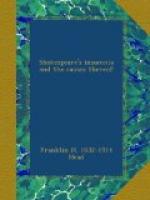Shakespeare describes, too, with lifelike fidelity, the causes of insomnia, which are not weariness or physical pain, but undue mental anxiety. He constantly contrasts the troubled sleep of those burdened with anxieties and cares, with the happy lot of the laborer whose physical weariness insures him a tranquil night’s repose. Henry VI. says:—
“And to conclude, the shepherd’s
homely curds,
His cold thin drink out of his leather
bottle,
His wonted sleep under a fresh tree’s
shade,
All which secure and sweetly he enjoys,
Are far beyond a prince’s delicates.”
And Henry V. says:—
“’Tis not the balm, the sceptre
and the ball,
The sword, the mace, the crown imperial,
The intertissued robe of gold and pearl,
The farced title running ’fore the
king,
The throne he sits on, nor the tide of
pomp
That beats upon the high shore of this
world,—
No, not all these, thrice gorgeous ceremony,
Not all these, laid in bed majestical,
Can sleep so soundly as the wretched slave,
Who, with a body filled and vacant mind,
Gets him to rest, crammed with distressful
bread;
Never sees horrid night, that child of
hell,
But, like a lackey, from the rise to set,
Sweats in the eye of Phoebus, and all
night
Sleeps in Elysium....
And, but for ceremony, such a wretch,
Winding up days with toil and nights with
sleep,
Hath the forehand and vantage of a king.”
Prince Henry says, in “Henry IV.":—
“O polished perturbation! Golden
care!
That keep’st the ports of slumber
open wide
To many a watchful night, sleep with it
now!
Yet not so sound and half so deeply sweet
As he whose brow with homely biggin bound
Snores out the watch of night.”
In this same play, too, is found the familiar and marvellous soliloquy of Henry IV.:—
“How many thousand of my poorest
subjects
Are at this hour asleep! O Sleep,
O gentle Sleep,
Nature’s soft nurse, how have I
frighted thee,
That thou no more wilt weigh my eyelids
down
And steep my senses in forgetfulness?
Why rather, Sleep, liest thou in smoky
cribs,
Upon uneasy pallets stretching thee,
And hushed with buzzing night-flies to
thy slumber,
Than in the perfumed chambers of the great,
Under the canopies of costly state,
And lulled with sounds of sweetest melody?
O thou dull god, why liest thou with the
vile
In loathsome beds, and leav’st the
kingly couch
A watch-case, or a common ’larum-bell?
Wilt thou upon the high and giddy mast
Seal up the ship-boy’s eyes, and
rock his brains
In cradle of the rude, imperious surge,
And in the visitation of the winds,
Who take the ruffian billows by the top,
Curling their monstrous heads, and hanging
them
With deafening clamor in the slippery




